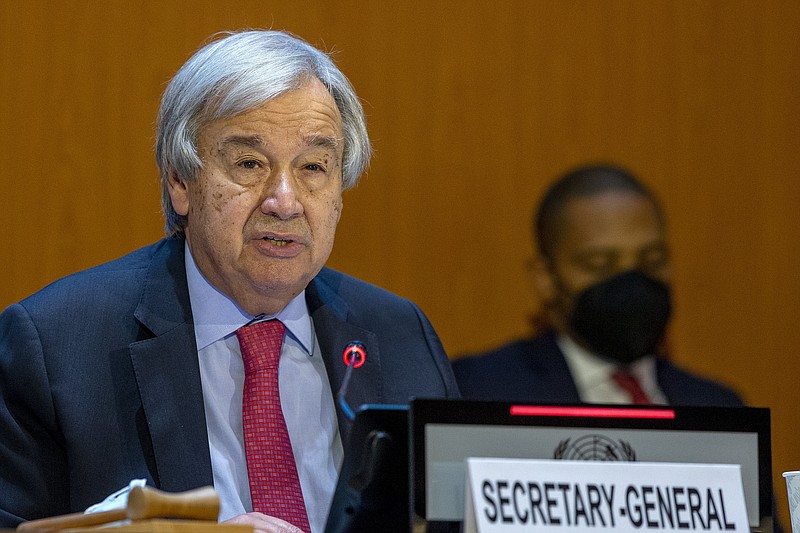GENEVA (AP) — The United Nations on Monday drummed up millions of dollars in emergency funds from donor countries for beleaguered Afghans who could soon face widespread hunger, even as Western governments and the U.N. human rights chief voiced concerns about the Taliban’s first steps in establishing power in Afghanistan.
The first such conference on Afghanistan since the Taliban took more than a month ago is testing Western governments and other big traditional donors, which want to protect Afghans from looming humanitarian disaster but also want to keep pressure on the new militant rulers to respect rights and moderate their rule.
It is feared Afghanistan could further plunge toward famine and economic collapse after the chaos of the past month, which saw the Taliban oust the government in a lightning sweep as U.S. and NATO forces exited the 20-year war. The U.N., along with its partners, is seeking $606 million for the rest of the year to help 11 million people.
“The people of Afghanistan need a lifeline,” U.N. Secretary-General Antonio Guterres told the conference. “After decades of war, suffering and insecurity, they face perhaps their most perilous hour. Now is the time for the international community to stand with them. And let us be clear, this conference is not simply about what we will give to the people of Afghanistan. It is about what we owe.”
He said one in three Afghans don’t know where their next meal will come from, the poverty rate is “spiraling” and basic public services were nearing collapse. A severe drought is jeopardizing the upcoming harvest, and hunger has been rising.
The U.N.’s World Food Program said Afghans are growing increasingly short of cash to buy food, the majority of which — like wheat flour — is imported. Frozen foreign exchanges and a paralyzed state budget have stripped people of the money they need, just as food and fuel prices have risen.
As with many other U.N.-led donor conferences, some countries injected more funds, others highlighted commitments already made. German Foreign Minister Heiko Maas announced plans for Germany to pour $590 million into Afghanistan and its neighboring countries, but specifics were not immediately provided. Denmark said it would give an extra $38 million, and Norway $11.5 million.
At the same time, officials suggested aid in the future could be impacted by how the Taliban rules.
Linda Thomas-Greenfield, the U.S. ambassador to the United Nations, said the U.S. was “committed to providing humanitarian assistance” for and supporting Afghans, and would add $64 million in new assistance for U.N. and partner organizations. That brings the U.S. total for Afghanistan to $330 million in this fiscal year, she said.
“We need oral and written commitments made by the Taliban about operating rights of humanitarian agencies and the treatment and rights of minority groups, women and girls to be upheld,” she said by video message. “Words are not good enough. We must see action. The international community is unified in this message.”
Germany’s Maas, speaking to the Human Rights Council also in Geneva, said the world has a “moral obligation” to help the Afghan people. But he also said the level of Taliban’s respect of human rights, particularly of women and girls, would be a “benchmark for us and our partners in determining our future engagement with a new Afghan government.”
He also criticized the Taliban’s decision to exclude other groups from their recently announced interim government, saying it was “not the right signal” for international cooperation and stability.
The world has been watching closely to see how Afghanistan under a Taliban government might be different from the first time the Islamic militants were in power, in the late 1990s. During that era, the Taliban imposed a harsh rule by their interpretation of Islamic law. Girls and women were denied an education and were excluded from public life.
Initially after seizing power Aug. 15, the Taliban promised inclusiveness and a general amnesty for former opponents. But many Afghans remain deeply fearful, particularly because of early Taliban moves.
The group formed an all-male, all-Taliban government despite saying initially they would invite broader representation. Taliban police officials have beaten Afghan journalists and violently dispersed women’s protests.
The U.N. human rights chief, Michelle Bachelet, warned of a “new and perilous phase” for Afghanistan as she upbraided the Taliban for a disconnect between their words and actions.
Speaking to the rights council, she said her office has received credible allegations of reprisal killings by the Taliban of former Afghan security forces, as well as instances in which officials in the previous government and their relatives were arbitrarily detained and later turned up dead.
Bachelet cited multiple allegations of Taliban forces conducting house-to-house searches looking for specific officials in the previous government and people who cooperated with U.S. forces and companies. She said during the last three weeks, women have been progressively excluded from the public sphere, in contradiction to Taliban assertions to respect women’s rights.

